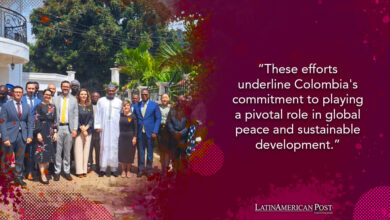Unpublished Interview With Gabriel García Márquez: “You Cannot Use Literature Like a Rifle”
This week, an unpublished interview with Gabriel García Márquez, Colombian Nobel Prize winner in literature in 1982, was published by the Spanish magazine TintaLibre .

Photo: CDMX Government
EFE
Listen to this article
Leer en español: Entrevista inédita a Gabriel García Márquez: “no se puede utilizar la literatura como un fusil”
In an unpublished interview from 1994, Gabriel García Márquez talks extensively about the Caribbean, love, his ideas, but, above all, culture. The Colombian considered that music cannot be used as a rifle "because it always goes wrong, it neither shoots nor is it useful for dancing", just as happens with literature.
He also expressed his confidence in having reflected the reality of the Caribbean without giving the impression that he was trying to make a revolution.
These are some of the statements of the 1982 Nobel Prize in Literature in an interview that he gave when he was 67 years old to the documentary filmmaker Jon Intxaustegi with the participation of the recently deceased journalist Mauricio Vicent and that was published this Monday by the Spanish magazine TintaLibre, after the agreement between the newspaper El País and InfoLibre.
Recorded on May 6, 1994 in Havana, the writer, who died in April 2014 in Mexico City, assured that "committed art is a European invention, it is completely academic."
"All authentic popular art of course carries a commitment and up to that point it is valid," said García Márquez. "The bad thing is when it comes to using music as a rifle because it always goes wrong, it neither shoots nor is it useful for dancing."
"And that," he added, "happens not only with music, but also with literature, that is, I have the intention of having expressed a reality with which I totally identify, which is that of the Caribbean, without giving the impression of being political propaganda or trying to make a revolution, although I do believe that it is a contribution to the progress of Latin America."
Music and the Caribbean in the work of Gabriel García Márquez
Music and the Caribbean are two of the topics that the Colombian talked about most in this extensive interview, who maintained that for him his novel One Hundred Years of Solitude was a 450-page vallenato, while Love in the Time of Cholera was a 380 page bolero. "And I say that in all seriousness," he maintained.
In that music, at first, "what interested me most was the story they told, not so much the music. But later the history, the facts and practically the life of the region always remained linked to the music. I have the impression that, of all my books, the one that best summarizes the Caribbean is Of Love and Other Demons ," he indicated.
Read also: Interview With Ida Vitale: "100 Years Don't Weigh Me Down"
A Caribbean of which he explained an idea that no one wanted to pay attention to: "the Caribbean is not a geographical area, but a cultural area: it does not only encompass the Caribbean Sea, but for me it begins in the south of the United States, Louisiana and Florida, and it extends to the north of Brazil. That is, it is not a geographical territory, but a cultural territory."
"I totally identify with the reality of the Caribbean, at all levels and in all activities of daily life: food, music, the way of loving, living, singing, being, being born and dying", he emphasized.
Thus, he explained, his Macondo from "One Hundred Years of Solitude" was not a geographical place but "a state of mind, it is the state of mind in which one lives in the Caribbean."
Regarding love, he indicated that it was not the axis of his creation, but rather it was the axis of his life, in such a way that he believed that "everything that can really move in art has to be based on love."
Regarding literature and magical realism, he claimed that it was not magical. "For us it is simply realism, without an adjective."
In his opinion, there was a cultural invasion of Latin America in the United States that was not planned "and that is of such effectiveness that it is really changing North American culture." "We are changing their music, we are changing their way of living, eating, we are changing their lives," he maintained.
And about himself he noted: "What would be great is to collect all the legends that exist about me, because maybe it is more interesting than my life."




